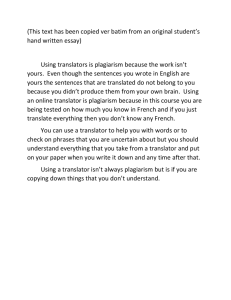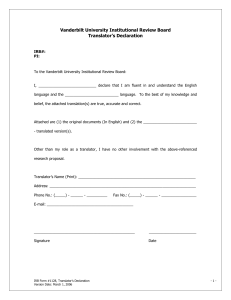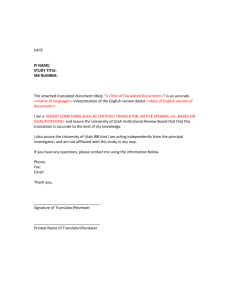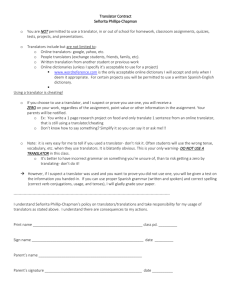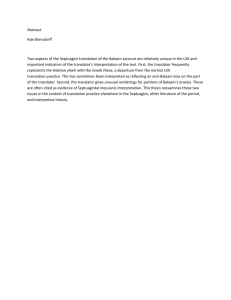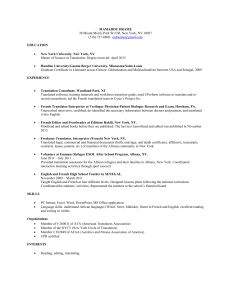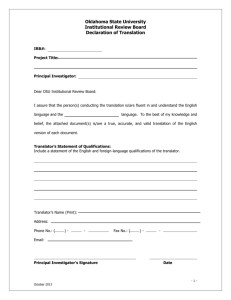nef_adv_file_tests_ans_03
advertisement
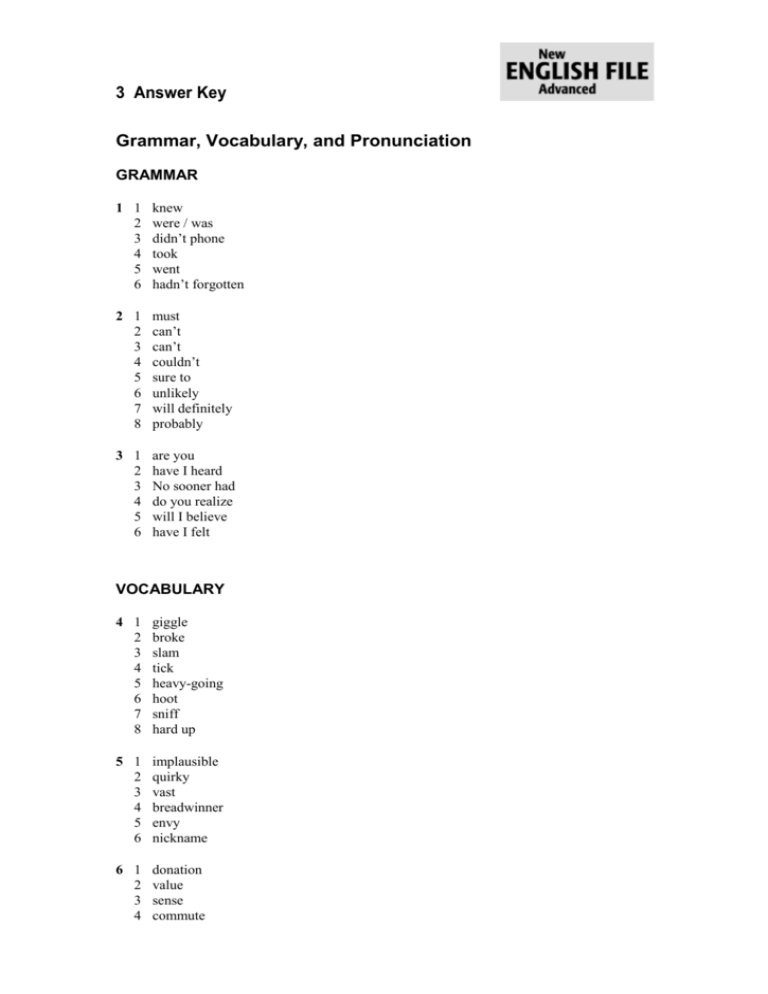
3 Answer Key Grammar, Vocabulary, and Pronunciation GRAMMAR 1 1 2 3 4 5 6 knew were / was didn’t phone took went hadn’t forgotten 2 1 2 3 4 5 6 7 8 must can’t can’t couldn’t sure to unlikely will definitely probably 3 1 2 3 4 5 6 are you have I heard No sooner had do you realize will I believe have I felt VOCABULARY 4 1 2 3 4 5 6 7 8 giggle broke slam tick heavy-going hoot sniff hard up 5 1 2 3 4 5 6 implausible quirky vast breadwinner envy nickname 6 1 2 3 4 donation value sense commute 3 Answer Key 5 small 6 tongue PRONUNCIATION 7 1 whistle, savings 2 sob 3 debt, approached 8 1 2 3 4 5 overly witty beyond exchange instalment Reading and Writing READING 1 2 3 4 5 6 7 8 9 10 B C B A B B A C B A LOST IN TRANSLATION? There’s a well-known story in the world of literary translators about the translator who was thrilled to see his work appear at great length in an article in a prestigious magazine. He had translated a number of novels by a little-known Scandinavian novelist, who he believed had been neglected and not received the attention or praise he deserved. He had dedicated much of his working life to trying to get this novelist some recognition. (1) The article agreed with his assessment of the novelist’s work and illustrated its view of his worth by quoting long passages from the translations. But something was missing. The translator searched in vain for a mention of his name. It didn’t appear anywhere. The translator’s joy at the coverage of his favourite author was considerably spoilt by this. (2) He felt that he himself should have had some recognition in the article. The implication was that the translations had just appeared from nowhere, or even perhaps that the novelist had done them himself. It 3 Answer Key was as if the translator did not exist, and all the efforts he had made had never happened. This incident raises a fundamental question about the status and function of the literary translator. Most people would agree that it was wrong of the magazine to omit any mention of the translator. However, (3) it is also true that readers themselves operate in exactly the same way, and for them it is also as if the translator didn’t exist. When people read a translation of a novel, they want to feel they are reading what the novelist, and not someone else, wrote. They don’t want to be reminded that they are not reading, and would not be able to read, the original novel as created by the novelist. (4) The translator has fulfilled a necessary function for them, but they do not wish to know who the translator was or pay any attention to what they have done. But to what extent do translators manage to stay faithful to what a novelist wrote, not just in terms of the actual meaning but in terms of subtleties of style, nuances of meaning, the true flavour of the original work? If you look at different translations of the same novel, you’ll find any number of variations in how the same things from the original have been translated. So translators play a very important role, not just in allowing us access to works of literature we would not otherwise be able to read, but also in affecting our experience of reading those works and our understanding of what the novelist was trying to convey in his original prose. (5) A single phrase, sentence or image could be translated in several different ways and the translation provided by one translator may be wholly different from that of another. The reader cannot question this; (6) readers are simply the receivers of what the translator does. So even though we might wish for direct contact with the novelist, we depend on the translator. In this global age, translators have become even more important. (7) More and more works of fiction are being translated into more and more languages. Readers are now able to experience and understand other cultures more than ever through the reading of translated novels. The works of more and more novelists are now accessible to people in other parts of the world. This applies not only to new novels but also to fresh translations of old classics. The adventurous reader can now enjoy novels from many eras and many cultures that previously they would not have been able to. And central to this is (8) the translator, working heroically to come up with the translation that captures exactly what is in the original work, and often poorly paid. Although readers may be happy for them to remain obscure, perhaps they should be getting the recognition they deserve. WRITING Student’s own answers. Task completion: The task is fully completed and the answer easy to understand. (4 marks) 3 Answer Key Grammar: The student uses appropriate structures to achieve the task. Minor errors do not obscure the meaning. (3 marks) Vocabulary: The student uses a sufficient range of words and phrases to communicate the message clearly. (3 marks) Listening and Speaking LISTENING 1 1 2 3 4 5 D F A B H 2 1 2 3 4 5 military signals people’s homes stimulating in-house orchestra elevator music SPEAKING Interactive communication and oral production: The student communicates effectively with his / her partner, asking and answering simple questions, and where necessary initiating conversation, and responding. The student uses appropriate strategies to complete the task successfully. (10 marks) Grammar and Vocabulary: The student uses a sufficient range of vocabulary and structure to communicate clearly. Minor occasional errors do not impede communication. (5 marks) Pronunciation: The student’s intonation, stress, and articulation of sounds make the message clear and comprehensible. (5 marks)
